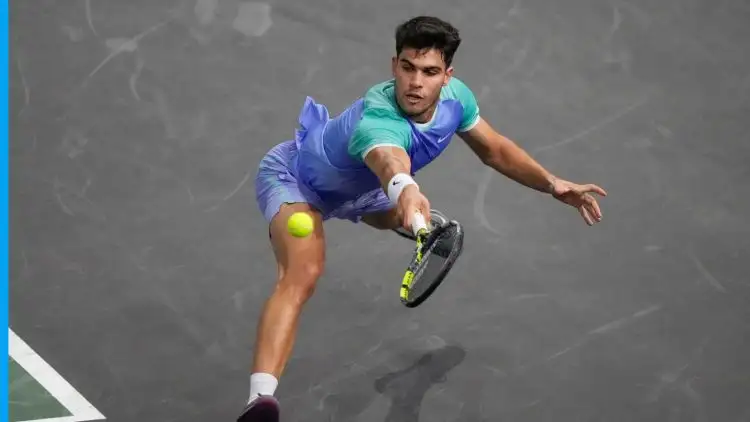
Carlos Alcaraz’s Paris Masters journey came to an unexpected end after a stunning defeat by Ugo Humbert, and the World No. 2 didn’t hold back in his criticism of the tournament organizers. Alcaraz, who entered the tournament as the highest-ranked player following Jannik Sinner’s withdrawal due to illness, was visibly frustrated with the playing conditions, specifically the unusually rapid court speed at the Accor Arena in Bercy. He expressed his dissatisfaction in a post-match interview, suggesting that the court’s fast pace made it challenging for him to play his best game.
Alcaraz’s concerns about the court surface were clear from the beginning of the tournament, as he first voiced his complaints after a hard-fought win against Nicolas Jarry. That initial match foreshadowed what was to come, as Alcaraz struggled to adjust to the surface. Facing Humbert, he was eventually defeated in a three-set battle, 6-1, 3-6, 7-5, with the lively French crowd cheering their home player to what became a landmark victory in his career.
Though typically composed and sportsmanlike in both victory and defeat, Alcaraz couldn’t hide his frustration this time. He admitted that the court conditions impacted his performance, explaining that the fast surface caught him off guard. “This court… I mean, I don’t want to say something that is going to sound like an excuse,” Alcaraz began diplomatically before addressing the issue head-on. “First of all, Ugo deserves to win, that’s obvious, but it depends. I play, for example, on the Davis Cup indoor court, and that court was way slower than this one.”
Alcaraz elaborated further, noting the discrepancy in court speeds across different tournaments and the Paris Masters’ divergence from previous years. “When I played the first match, the stats came out that it is the fastest court in the Masters 1000, probably on the tour right now. This is crazy. I don’t know. Probably the fastest one, you know, in the last ten years in this tournament,” he continued. Alcaraz’s remarks reflected his perplexity at the decision to modify the court, especially to such an extreme degree. “I don’t know why they do it. I don’t know why they have changed a court from other tournaments and obviously in the same tournament, comparing to other years.”
The fast conditions seemingly worked against Alcaraz’s game, which relies on establishing rhythm and using his powerful groundstrokes to control rallies. Reflecting on his approach, Alcaraz suggested that perhaps he should have arrived in Paris earlier to acclimate to the unique conditions. “I came here with not too many days. Probably I had to come earlier to get used to these conditions, but I didn’t,” he admitted, though he reiterated his surprise and dissatisfaction with the court’s speed. “Honestly, all I can say is I don’t understand why they did it.”
Alcaraz’s frustration was amplified when he explained the impact on his playing style. “For my level, I try to change up as much as I can to this court, to this speed. I thought that it suits pretty well to my game, but it doesn’t.” Playing against Humbert, Alcaraz struggled to find his rhythm. Humbert’s consistent and flat shots left Alcaraz with few opportunities to settle into his usual flow, a point he acknowledged. “When I play against someone like Ugo that doesn’t let you get rhythm into the match, he plays probably every time at his 100%, really flat. So I couldn’t play good tennis,” he explained. Alcaraz also noted that while he had trained on fast courts, this particular surface was far quicker than he anticipated. “I practiced at home, but it isn’t the same court that I thought,” he said. “I was surprised about everything a little bit.”
For Ugo Humbert, however, the court conditions seemed perfectly suited to his game, and he delivered a performance that left the crowd roaring in support. Humbert, ranked World No. 18, embraced the moment and declared the match to be the highlight of his career. “It’s the most beautiful victory in my career, and it’s the best moment I’ve lived on a tennis court. It’s incredible,” Humbert said, his joy evident. He explained how he had envisioned this moment, training relentlessly for such an achievement. “I train for that. I practice for that. This is what I repeated to myself in the third set.”
Humbert also referenced a difficult loss in the same tournament last year, which motivated him to dig deeper in the closing stages of the match against Alcaraz. “I didn’t want what happened last year to repeat itself. I also thought about the match against Zverev, and it made me stronger.” This resilience paid off, as Humbert closed out the victory with poise and determination.
Humbert’s remarks captured his pure love for tennis and his approach to embracing each match as it comes. “This is what I love about tennis. I don’t want to make any predictions or tell you what’s going to happen. I try to live the moment to the full,” he said. As for how far he might go in the tournament, Humbert remained focused on enjoying each moment rather than placing expectations on himself. “I came to Bercy to live this kind of emotion, this kind of match. When it’s like that, anything is possible. I don’t know how far I’ll go, but it’s a question I don’t want to answer.”
Alcaraz’s defeat, while unexpected, showcased the unpredictability of indoor hard courts and the impact that court speeds can have on a player’s performance. His comments also reflect the complexities of adapting to ever-changing conditions on the ATP tour, as players must adjust their styles and strategies to suit each tournament’s unique environment. Humbert’s triumph highlighted the potential for breakthrough moments in tennis, where a supportive home crowd and favorable conditions combine to create a truly memorable win. As the Paris Masters continues, fans will be watching closely to see if Humbert can maintain his momentum and make an even deeper run in the tournament.
Leave a Reply